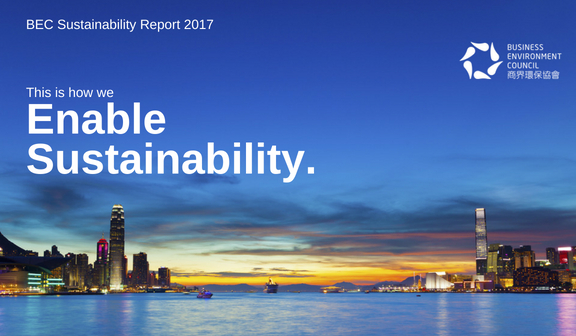Hong Kong, 21 August 2018 - Business Environment Council (“BEC”) today has published BEC Sustainability Report 2017 - This Is How We Enable Sustainability which describes how the organisation works with its over 200 members, partners and the wider community to enable sustainability in Hong Kong. The report also assesses the impact of its activities to determine opportunities where it can contribute to the concerted efforts to meet the United Nations Sustainable Development Goals (SDGs), emphasising SDG 4: Quality Education[1] and SDG 17: Partnerships for the Goals[2] as BEC’s areas of greatest impact.

From 1 October 2015 to 30 September 2017, the organisation delivered 316 environmental projects, and 14 policy submissions addressing important topics including the Chief Executive Policy Address, Lantau Development and Hong Kong 2030+. The report also presents BEC’s environmental performance as a Green Hub which attained the final BEAM Plus Platinum Rating (Existing Buildings). Despite continued growth in the BEC building users with an increase in the number of tenants and staff, there was a significant decrease in the building’s greenhouse gas and energy intensities, which fell by 28%, and 20%, respectively, since fiscal year 2013/14 which marked the beginning of the BEC Headquarters Transformation Project.
“It is my pleasure to present BEC’s second biennial sustainability report. BEC follows industry best practice and is one of the few non-profit organisations in Hong Kong committed to such high levels of Environmental, Social and Governance (ESG) disclosure. As the only organisation in Hong Kong with a mission that aims to mobilise the vast capacity of the business community for environmental sustainability, BEC is dedicated to raising environmental awareness, expanding the city’s environmental knowledge, while also monitoring our own daily operations for the best ESG performance. BEC will continue to engage with the government, the business sector, academia and our local and international partners to offer sustainable solutions and professional services to contribute to the transition to a low carbon economy.” BEC Chief Executive Officer Mr Adam Koo said.
Titled This Is How We Enable Sustainability, the report showcases how the organisation enables environmental sustainability in Hong Kong and the world through sharing and enhancing knowledge, its operations, green collaborations and practical projects, and how it contributes to the United Nations Sustainable Development Goals. The report concludes with two major areas that will affect the future of environmental sustainability:
- Businesses will operate in a highly urbanised world that will be affected by resource scarcity and climate change, making energy efficiency and climate resilience crucial for the vitality of businesses and cities.
- Businesses will operate in a hyper-connected world with accelerated technological breakthroughs. Big data and artificial intelligence will be answers to a smart and sustainable future.
ESG reporting is one of BEC’s core focuses. BEC has in-depth knowledge of the GRI reporting framework as well as the HKEx ESG Reporting Guide and has a wealth of experience guiding companies through sustainability related strategy development, communications and reporting. BEC’s ESG Advisory Group has the primary objective of promoting best practice in ESG performance and disclosure.
BEC Sustainability Report 2017 can be accessed at BEC’s website at: http://bit.ly/BECSR2017 (Registration Closed)
[1] BEC specifically contributes to SDG 4.7: By 2030, ensure that all learners acquire the knowledge and skills needed to promote sustainable development, including, among others, through education for sustainable development and sustainable lifestyles, human rights, gender equality, promotion of a culture of peace and non-violence, global citizenship and appreciation of cultural diversity and of culture’s contribution to sustainable development.
[2] BEC specifically contributes to SDG 17.16: Enhance the global partnership for sustainable development, complemented by multi-stakeholder partnerships that mobilise and share knowledge, expertise, technology and financial resources, to support the achievement of the sustainable development goals in all countries, in particular developing countries; and SDG 17.17: Encourage and promote effective public, public-private and civil society partnerships, building on the experience and resourcing strategies of partnerships.
